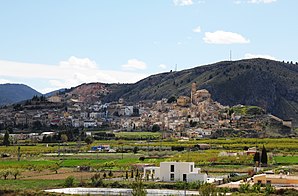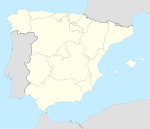Cehegín
| Cehegín municipality | ||
|---|---|---|
 Cehegín - town view
|
||
| coat of arms | Map of Spain | |

|
|
|
| Basic data | ||
| Autonomous Community : | Murcia | |
| Province : | Murcia | |
| Comarca : | Noroeste | |
| Coordinates | 38 ° 3 ′ N , 1 ° 14 ′ W | |
| Height : | 540 msnm | |
| Area : | 299.29 km² | |
| Residents : | 14,983 (Jan 1, 2019) | |
| Population density : | 50.06 inhabitants / km² | |
| Postal code : | 30430 | |
| Municipality number ( INE ): | 30017 | |
| administration | ||
| Website : | Cehegín | |
Cehegín is a small town in southern Spain and a municipality ( municipio ) consisting of several villages and hamlets with a total of 14,983 inhabitants (as of January 1, 2019) in the north of the province of Murcia in the autonomous region of Murcia of the same name . The center of the village was recognized as Conjunto histórico-artístico in 1982 .
location
The small town of Cehegín is located on the Río Argos a good 65 km (driving distance) west of the city of Murcia at an altitude of about 540 m above sea level. d. The climate in winter is temperate, in summer it is warm to hot; the low amounts of precipitation (approx. 350 mm / year) fall - with the exception of the almost rainless summer months - distributed over the whole year.
Population development
| year | 1857 | 1900 | 1950 | 2000 | 2016 |
| Residents | 8,710 | 11.601 | 15,830 | 14,171 | 15,321 |
The continuous increase in population is mainly due to the ongoing immigration from the rural area.
economy
Cehegín is located in the rural area of the province of Murcia; mainly fruit and olive trees were planted. Small traders, craftsmen and service companies of all kinds have settled in the village. As early as 1750, several natural stone deposits were known in the vicinity of the place, but it was not until the 20th century that smaller marble quarries emerged.
history
The oldest finds that testify to the presence of man in the region are dated to the Neolithic ; At Abrigo del Pozo there are remains of rock paintings that are part of the UNESCO World Heritage of rock paintings in the Spanish Levant . Iberian , Roman and Visigoth finds were made in the ancient city of Begastri ; from the year 560 Begastri was the bishopric. In the years after 711 the area was overrun by the Moors . After the recapture ( reconquista ) of the region by Castilian troops under Alfonso X in 1243, the quasi-independent was Taifa Kingdom of Murcia in a Christian kingdom converted, which, however closely with the Crown of Castile was intertwined, but it came in the years 1296 until 1304 temporarily under Aragonese rule . It was only during this period that the new town of Cehegín came into being and developed and was administered by the Order of Santiago from 1344 .
Attractions
- Construction of the Iglesia de Santa María Magdalena began in the 16th century, but completion dragged on until the end of the 17th century. The three-aisled basilica is covered by a rib vault and is now used as a museum for sacred art.
- The Iglesia de la Soledad dates from around 1600; however, the bell tower was not built until the 18th century. The church also has three naves. There are several baroque altars on the outer walls; behind the main altar is a camarín .
- The Iglesia de la Concepción , both inside and out, is the oldest church in the city - it was built around 1500; its portal shows clear Renaissance influences. The choir area is raised by several steps compared to the nave .
- The Convento de San Esteban was the Church of the Franciscan Order ; it originated from the 16th to the 18th century. The church has a camarín behind the main altar. The center of the exam area was the cloister .
- The Museo arqueológico is located in a Renaissance palace. It mainly shows finds from Begastri .
- The Palacio de la Tercia is a city palace in the Mudejar style ; it belonged to the Santiagoorden , which used the cellar vaults as storage rooms for wine and grain. The building now houses an exclusive restaurant.
- Surroundings
- The Parque arqueológico de Begastri is located about 3 km east of the city. Only the preserved parts of the city wall (muralla) are impressive . All significant finds are exhibited in the local Museo Arqueológico .
Sons and daughters
- Sebastián Chico Martínez (* 1968), Roman Catholic clergyman, auxiliary bishop in Cartagena
- Ana Carrasco (* 1997), motorcycle racer
Web links
- Cehegín, sights - photos + information (Spanish)
- Cehegín - website with numerous links, photos + information (Spanish)
Individual evidence
- ↑ Cifras oficiales de población resultantes de la revisión del Padrón municipal a 1 de enero . Population statistics from the Instituto Nacional de Estadística (population update).
- ↑ Cehegín - map with altitude information
- ↑ Cehegín - climate tables
- ↑ Cehegín - population development
- ↑ Cehegín - Economy etc.
- ↑ Cehegín - History
- ↑ Cehegín - Church of Santa María Magdalena
- ↑ Cehegín - Soledad Church
- ↑ Cehegín - Church Concepción
- ↑ Cehegín - Convent of St. Stephen
- ↑ Cehegín - Museo
- ↑ Cehegín - Palacio de la Tercia
- ↑ Cehegín - Begastri ( Memento of the original from September 15, 2017 in the Internet Archive ) Info: The archive link was inserted automatically and has not yet been checked. Please check the original and archive link according to the instructions and then remove this notice.


